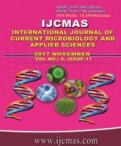


 National Academy of Agricultural Sciences (NAAS)
National Academy of Agricultural Sciences (NAAS)

|
PRINT ISSN : 2319-7692
Online ISSN : 2319-7706 Issues : 12 per year Publisher : Excellent Publishers Email : editorijcmas@gmail.com / submit@ijcmas.com Editor-in-chief: Dr.M.Prakash Index Copernicus ICV 2018: 95.39 NAAS RATING 2020: 5.38 |
To increase the accumulation of atmospheric carbon dioxide is due to the anthropogenic activity, natural fire and industrialization induced climate change. To increase the pressure regarding reduce the concentration of CO2 in the environment, sequestration of carbon is the trend to improve the carbon sink and environmental health in soil. The maintenance of a threshold level of organic matter in the soil is crucial for maintaining physical, chemical and biological integrity of the soil and also for the soil to perform its agricultural production and environmental functions. The application of biochar to the soil is proposed as a novel approach to establish a significant long term sink for atmospheric carbon dioxide in terrestrial ecosystems. For rising interest regarding carbon sequestration and soil sustainability field experiment was conducted to determine the influence of biochar and fertiliser with biofertiliser for yield, quality and soil fertility of maize in Typic Haplustalf of Tamirabharani tracts. The experiment was imposed with randomized block design with fifteen treatments (two levels of biochar and two levels of recommended dose of fertiliser with biofertiliser (Azophos 4 pockets ha-1) and two replications. Application of biochar with inorganic fertilisers and biofertiliser increased the yield components of maize viz., hundred grain weight (38.9g), cob length (23.5cm), cob weight (310g), grain yield (8100 kg ha-1) and stover yield (12,150 kg ha-1) and also quality trait such as crude protein content. Higher yield and quality was obtained from the combination of 5 t ha-1 plus 100 per cent recommended dose of N, P2O5 and K2O plus biofertiliser on maize. The combined application of biochar with 100 per cent recommended dose of fertiliser and biofertiliser increased the yield, quality and soil fertility in maize growing soil.
 |
 |
 |
 |
 |